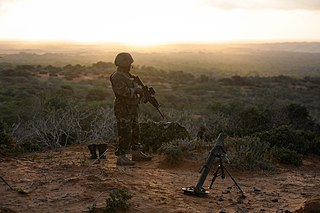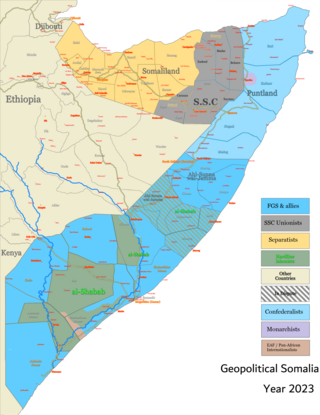
The African Union Mission in Somalia (AMISOM) was a Multinational force formed by the African Union. The operation deployed to Somalia soon after the Islamic Courts Union was deposed by troops from Ethiopia during a large scale invasion in late 2006. The missions primary objective was to maintain the regime change between the ICU and the newly installed Transitional Federal Government, implement a national security plan and train the TFG security forces. As part of its duties, AMISOM later supported the Federal Government of Somalia in its war against Al-Shabaab. AMISOM was the most deadly peacekeeping operation in the post-war era.

The Somali Civil War (2009–present) is the ongoing phase of the Somali Civil War which is concentrated in southern and central Somalia. It began in late January 2009 with the present conflict mainly between the forces of the Federal Government of Somalia assisted by African Union peacekeeping troops and al-Shabaab militants who pledged alliegence to al-Qaeda during 2012.

A series of battles in Hiraan, Shabeellaha Dhexe and Galgudug, between rebels of al-Shabaab and Hizbul Islam and Somali government forces and ICU militants loyal to the government, erupted during spring 2009. The fighting led to al-Shabaab capturing major government strongholds and Ethiopian forces re-entering Somalia and setting up bases in Hiraan. There was a halt in fighting during a government offensive in Mogadishu, which started on May 22.

This is a 2011 timeline of events in the Somali Civil War (2009–present).
The Battle of Gedo is a conflict of the 2009–present phase of the Somali Civil War. Centered in the region of Gedo, it pits the Somali government and its allies against the al-Qaeda-aligned militant group Al-Shabaab.

This is a 2012 timeline of events in the Somali Civil War (2009–present).

This is a 2014 timeline of events in the Somali Civil War (2009–present).

Operation Indian Ocean was a joint military operation between the Somali military, AMISOM and the United States military against the Al-Shabaab militant group aimed at eliminating the remaining insurgent-held areas in southern Somalia. It officially began in August 2014.

This is a 2015 timeline of events in the Somali Civil War (2009–present).
This article contains a timeline of events for the Somalimilitant group al-Shabaab.
The Golweyn ambush by al-Shabaab militants against an AMISOM convoy took place on 30 July 2017. Resulting in the death of several Ugandan soldiers, the attack seriously disrupted the control of pro-government forces over the Lower Shebelle region in Somalia, eventually leading to the fall of the strategically significant town of Leego to al-Shabaab.
Events in the year 2023 in Somalia.
On October 7, 2022, Somali Army troops repulsed an Al-Shabaab attack on a military base near Balad, Somalia. In the skirmish, nineteen al-Shabaab members were reportedly killed.
The battle of Runirgod took place between December 12 and December 22, 2022, with Somali forces launching an offensive against al-Shabaab in the Runirgod District of Middle Shabelle, the group's last stronghold in the state.
The battle of Buulo Mareer took place on 26 May 2023, when Al-Shabaab fighters stormed an African Union military camp manned by Ugandan forces in the town of Bulo Marer, Lower Shabelle, Somalia.
On January 6, 2023, al-Shabaab militants attacked the town of Hilowle Gaab, which had recently been recaptured by Somali forces. Over 20 people were killed in the attack, including several Somali commanders.
On January 14, 2023, al-Shabaab attacked two African Union bases in the cities of Buloburde and Jalalaqsi, both in Hirshabelle State, Somalia. Thirty-five people were killed, and dozens more were injured.
Events in the year 2024 in Somalia.

This is a 2024 timeline of events in the Somali Civil War (2009–present).
On April 2, 2021, Al-Shabaab militants simultaneously attacked Somali National Army bases in Awdheegle and Bariire, Lower Shabelle, killing forty-eight soldiers and dozens of al-Shabaab fighters. Somali forces were able to repulse both attacks.







